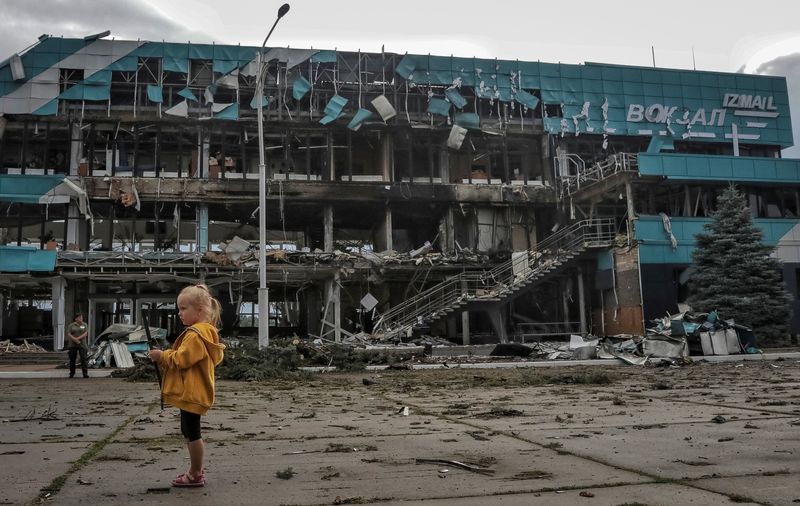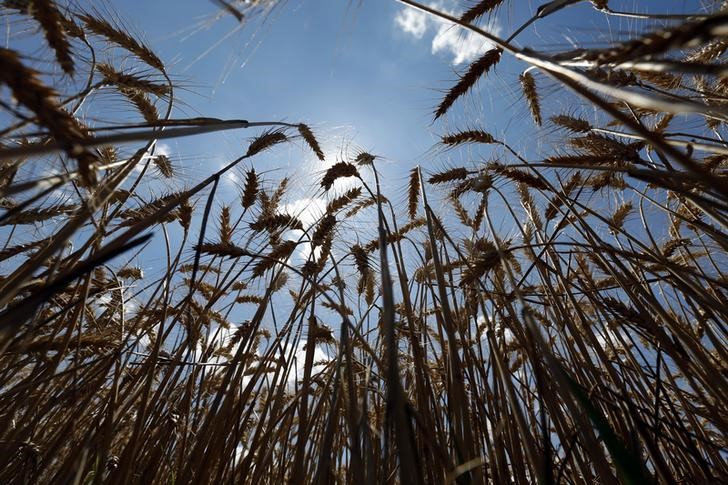By Pavel Polityuk
KYIV (Reuters) -Russia attacked Ukraine's main inland port across the Danube River from Romania on Wednesday, sending global food prices higher as it ramped up its use of force to prevent Ukraine from exporting grain.
The drone attacks destroyed buildings in the port of Izmail and halted ships as they prepared to arrive there to load with Ukrainian grain in defiance of a de-facto blockade Russia reimposed in mid-July.
Ukrainian Deputy Prime Minister Oleksandr Kubrakov said the Russian attacks damaged almost 40,000 tons of grain which had been destined for countries in Africa as well as China and Israel.
"Moscow is waging a battle for a global catastrophe," President Volodymyr Zelenskiy said in his nightly video address.
"In their madness, they need world food markets to collapse, they need a price crisis, they need disruptions in supplies."
Kubrakov, writing on Facebook (NASDAQ:META), said the Danube ports' infrastructure had been "devastated".
"Ukrainian grain is indispensable for the world and cannot be replaced by any other country in the coming years," he wrote.
"The port of Izmail suffered the most damage, including the terminal and infrastructure of the Danube Shipping Company."
Russian state news agency RIA said the port and grain infrastructure hit was housing foreign mercenaries and military hardware. A naval ship repair yard was also targeted, it said.
RIA provided no evidence to back up its assertion and Reuters was not able to verify the report.
Video released by Ukrainian authorities showed firefighters on ladders battling a blaze high in a building covered with broken windows. Several other large buildings were in ruins, and grain spilled out of at least two wrecked silos.
There were no reports of casualties, Odesa regional governor Oleh Kiper wrote in a post on the Telegram messaging app.
Commercial ship-tracking data showed dozens of international ships halting and dropping anchor at the mouth of the Danube, many of them registered to arrive in Izmail in an apparent attempt to breach Russia's blockade.
The port, across the river from NATO-member Romania, is the main alternative route out of Ukraine for grain exports, since Russia's blockade halted traffic at Ukraine's Black Sea ports in mid-July.
Two industry sources told Reuters operations at the port were suspended. Seaport authority head Yuriy Lytvyn said on Facebook that repair work had already begun and the port infrastructure continued to operate.
Chicago wheat prices rose by nearly 5% on supply concerns after the attack, only to tumble later on Wednesday on strong Russian exports and signs Moscow may be open to reviving the Black Sea corridor deal.
Ukraine is one of the world's top grain exporters. Russia has attacked its agricultural and port infrastructure for more than two weeks after refusing to extend the Black Sea agreement, which had lifted its war-time blockade of Ukrainian ports last year.
PUTIN SPEAKS WITH ERDOGAN
The United Nations has warned of a potential food crisis in the world's poorest countries due to Russia's decision to abandon the deal, brokered by the U.N. and Turkey.
The Kremlin said President Vladimir Putin spoke by telephone Turkish President Tayyip Erdogan and reiterated Russia's condition for rejoining the agreement: that a parallel deal improving terms for its own food and fertiliser exports be implemented. Those exports are already exempt from sanctions, which the West says Moscow aims to undermine by threatening the global food supply.
Erdogan's office said he and Putin agreed the Russian leader would soon visit Turkey. Putin, wanted by the International Criminal Court for war crimes, has made no official visits abroad this year, and has left former Soviet territory only once since launching his invasion - a day trip to Tehran more than a year ago. Erdogan has said he hopes to host Putin and convince him to rejoin the grain deal.
Moscow has described recent attacks on Ukraine's grain infrastructure as retaliation for a Ukrainian strike on a bridge across the Kerch Strait to Crimea used to supply its troops in southern Ukraine.
Russia's defence ministry imposed restrictions on movement of ships and aircraft in the strait on Wednesday, the TASS news agency reported. It did not give a reason for the move.
U.S. Ambassador to Ukraine Bridget Brink condemned Russia's attacks in a statement, listing recent targets: "Homes. Ports. Grain silos. Historic buildings. Men. Women. Children.
"Round-the-clock and intensifying Russian strikes on Kryvyi Rih, Kharkiv, Kyiv, Kherson make it clear once again Russia has no desire for peace, no thought for civilian safety, and no regard for people around the world who rely on food from Ukraine."
Ukrainian officials say Moscow has hit 26 port facilities, five civilian vessels and 180,000 tonnes of grain in nine days of strikes since quitting the grain deal.
Kyiv says the goal of the strikes is to reimpose Russia's blockade by persuading shippers and their insurance companies that Ukrainian ports are unsafe to resume exports.
Ukraine's Danube River ports such as Izmail accounted for around a quarter of grain exports before Russia pulled out of the Black Sea deal, and have since become the main route out, with grain sent on barges to Romania's Black Sea port of Constanta for shipment onwards.

Kyiv's goal is for international ships to go straight to its Danube ports and load directly, while Moscow says it will treat ships heading to Ukrainian seaports as potential military targets.
Asked about the situation on Wednesday, deputy U.N. spokesperson Farhan Haq told reporters: "We continue to reach out, at various levels, to make sure that we can continue to do as much as possible to get Ukrainian and Russian food and fertilizer out to markets, but it is difficult."
